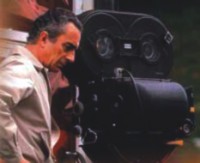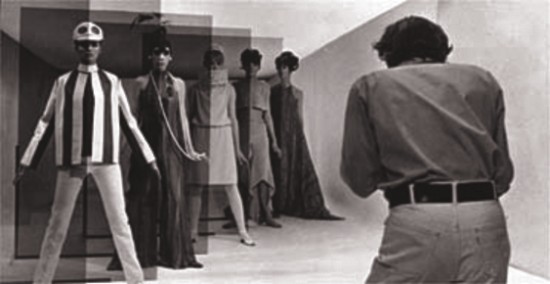|
Cinema
'Trust me. I am not God, but I am Antonioni'
Perhaps it was my beard that Antonioni liked. I was at a frustrating point in my career in 1966, doing a bit of this and a bit of that, and, like all actors I suppose, I thought I was very good and ought to be doing a lot better. There was a tradition that I'd been brought up with at Rada that if you didn't make it by the time you were 30, you'd had it; I was 29 and a half. I had tried myself bare-faced and wasn't doing too well, so I'd grown a beard and put my picture in the Spotlight actors directory, with "is prepared to shave" underneath in brackets.
 The fact that Michelangelo Antonioni was going to make a film in London was very exciting. Everyone was talking about it. He was known to be very particular in the way he worked; Richard Harris had walked off one of his pictures, I believe. But when I went along to see him, I found him utterly charming. He just talked to me for a while -- without getting me to do anything -- and told me, then and there, that I had got the part. And he was very keen on me having the beard; he liked that. The fact that Michelangelo Antonioni was going to make a film in London was very exciting. Everyone was talking about it. He was known to be very particular in the way he worked; Richard Harris had walked off one of his pictures, I believe. But when I went along to see him, I found him utterly charming. He just talked to me for a while -- without getting me to do anything -- and told me, then and there, that I had got the part. And he was very keen on me having the beard; he liked that.
When I left his offices, I went straight to the loo in Piccadilly, and in the next stall was a young actor who I'd met occasionally in pubs: David Hemmings. Hi David, I said. He said, "Alright." I've just been to see Antonioni for Blow-Up, and he's offered me a part, I explained, with great excitement. "I've just been up to see him as well," he replied, "and I've been offered the lead." David was playing the part of a photographer, and I was his agent. I had been given the script by Antonioni, and what excited me very much was a scene I had with David, after he'd done the blow-ups and had come looking for me. I'm at a party, a very druggy party in the middle of the night, and in this scene I had a speech that was the absolute hinge of the movie, which was marvellous of course.
This scene was to be my very first night's shooting, so I arrived on set, a house in Cheyne Walk, and went into makeup. As I sat there, Piers Haggard, who was working as Antonioni's assistant, came up and said there had been some rewrites, which is quite usual on a movie. But then I saw that this speech had been cut. And in my innocence, and no doubt arrogance, I thought that a terrible mistake had been made. So I said to Piers that Antonioni mustn't cut that speech, that it was essential to the whole film. I demanded to talk to him about it. Piers said, "You must be joking! Nobody goes and talks to Antonioni about the cuts he's made." But I said I was sorry, but that I was serious. I threatened to walk away unless I could speak to Antonioni.
So in the end, Piers took me next door. There was Antonioni is this very large room, which he'd cleared of about 300 extras, all of whom were sitting on the stairs. He always did this after he had shot a scene, he would clear everybody out and then talk to his lighting cameraman about the next shot. Piers went in, very nervous. Then he came back and said: "Antonioni will speak to you." So I went in.
Antonioni was grace itself, quite beautifully mannered. He said, "Peter, you are worried because I have cut this speech. Could you tell me why you are so concerned?" So I launched into an explanation of why he shouldn't cut the speech. He listened, and listened, until finally I ran out of words. There was silence. So I said, "Erm, sir, are you going to put the speech back in now?" He replied, "No. Because, Peter, you have explained to me exactly why I should cut it. If I leave the speech in, everyone will know what the film is about, but if I take the speech out, everyone will say it is about this, it is about that, it is about the other. It will be controversial." So it was cut. But there is a speech, which I have, which explains exactly what the film is about. It is all there in the film, if you know where to look, but I can't disclose specifically what it is. Antonioni is still alive, so if anybody's going to say anything it's up to him.

Master at work ... Antonioni on the set of his classic 60s film Blow-Up. Photograph: British Film Institute
You knew you were in the presence of a great man with Antonioni; he was an auteur supreme. He wanted everything exactly right. So he wouldn't let David see any of the rushes, for example, because he was concerned that actors worry when they see things on the screen. We had also heard how particular he was about colours. I'm colour-blind so I can't tell, but he was supposed to have sprayed the grass at Greenwich Park because he wasn't happy about the green. He was even said to have changed the colour of the marijuana in Blow-Up because he thought it was the wrong shade. We had rehearsed a scene in a restaurant for almost a whole day before we finally reached the stage where we could shoot. To begin with, I had always picked up the napkin that I was to use and put it on my knees, but on the take I stuck it in my collar, at which Antonioni called "Cut!" and came over. He ruffled the napkin, asking, "What is this?" "I'm so sorry, Michelangelo," I said. "Why?" he replied. "Why are you sorry? I like it. You must do this. It is good. No, what I am concerned about is this napkin. It is not quite the same shade of blue as the tablecloth." So we had to stop filming while somebody found someone with keys to the shop that the tablecloth had come from, which was now closed, in order to buy a new set of napkins that matched. The producer, Carlo Ponti, was tearing out whatever hair he had left.
This was amazing to me, as I'd always been used to playing villains in The Avengers and The Persuaders and things like that. If you went to two takes on one of them you might not work again, and if you went to three you definitely wouldn't. But when I came to my first close-up with Antonioni, we went through one take, then another take, then another take. He'd say, "Cut. Now Peter, that was good. But it was not so good as take five. Although it was better than take seven. So, we go again."
He wanted me to use an upward inflection on my line, which didn't make any sense to me at all, but I was trying to do it. I have never had such close coaching from any other director, and many actors wouldn't stand for it. Finally, on take 13: "Cut. Print. Good. Peter, come with me." So he took me off set and said to me, "Peter, I understand. You wish to show the world what a fine actor you are." He got that right. "When you work with other directors you give them your performance and they film it. Not with me, Peter. You see I have chosen you for how you look. I have chosen all your clothes. If I move my camera six inches, I would ask you to do that line in a different way." Upon this, he put his arms around me and held me close to him and said, "Peter, believe in me. Trust me. I am not God, but I am Michelangelo Antonioni."
Copyright
(R) thedailystar.net 2005
|
